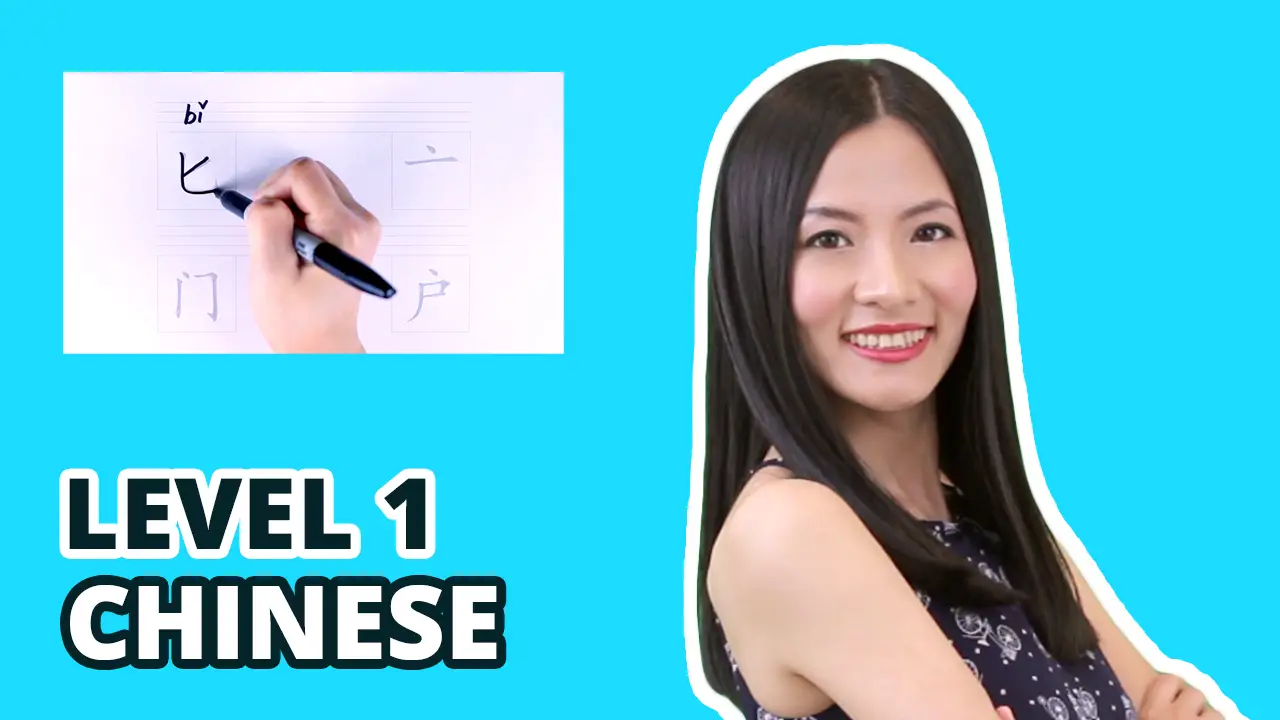Level 1 Lesson 24.1 – Can I Turn on the Computer?
Ask Can I Do Something in Chinese with Modal Verb 能 | 能 vs. 会 in Chinese
In this video lesson we'll learn how to ask can I do something in Chinese with 能, and also we'll compare 能 vs. 会 in Chinese.
- Ask Can I Do Something in Chinese with Modal Verb 能
- Answer 能-question with yes/no: 可以/不行
- 能 vs. 会 in Chinese
- 开 vs. 关 in Chinese
VOCABULARY
GRAMMAR
Grammar 1: Ask Can I Do Something in Chinese with Modal Verb 能 · HSK 1
The Modal Verb 能 néng can be used to suggest (1) possibility to do something (2) rationality to do something.
Like other Modal Verbs, 能 can be used before a Verb Predicate, following such structure,
Subject + 能 + Verb Predicate (+Object)
One thing to notice is that 能 is usually used (1) to ask a question or (2) in a negative sentences
For example,
(1) 能 used to ask a question
With Object
- wǒ néng kāimén ma 我能开门吗? can I open the door
- wǒ néng guān diànshì ma 我能关电视吗? can I turn off the TV
Without Object
- nǐ jīntiān néng lái ma 你今天能来吗? can you come today
- wǒ xiànzài néng zǒu ma 我现在能走吗? can I leave now
(2) 能 used in a negative sentences
With Object
- wǒ bùnéng guān diànshàn, tàirèle 我不能关电扇,太热了! I can't turn off the fan, (it is) too hot
- wǒmen bùnéng kāi diànshì, māma zài zhèlǐ shuìjiào ne 我们不能开电视,妈妈在这里睡觉呢! we cannot turn on the TV; mom is sleeping here
Without Object
- Zhāng lǎoshī xiàge xīngqī bùnéng qù 张老师下个星期不能去。 Teacher Zhang cannot go next week
- wǒ xiànzài bù néng shuō 我现在不能说。 I cannot tell (you) now
Grammar 2: Answer 能-Question With Yes/No: 可以/不行 · HSK 1
To answer 能-question with Yes/No, we don't really simply say néng 能 and bùnéng 不能 for yes and no.
More likely, we use kěyǐ 可以 for yes and bùxíng 不行 for no. For example,
Q: nǐ néng gěiwǒ mǎi běn shū ma
你能给我买本书吗?
can you buy me a book
Y: kěyǐ
可以。
yes; okay
N: bùxíng
不行。
no; (it's) not (gonna) work
Q: wǒ néng kāi diànshì ma
我能开电视吗?
can I turn on the TV
Y: kěyǐ
可以。
yes; okay
N: bùxíng
不行。
no; (it's) not (gonna) work
However, when the answer is no, answering with only 不行 might sound too blunt or impolite. Adding 对不起 and a little explanation can help soften the tone.
For example,
Q: nǐ néng kāi diànshì ma
你能开电视吗?
can you turn on the TV
A: duìbuqǐ, bùxíng, wǒ bù zhīdào kāiguān zài nǎr
对不起,不行,我不知道开关在哪儿。
sorry, no, I don't know where the power button is
Q: wǒmen jīntiān wǎnshàng néng chī pīsà ma
我们今天晚上能吃披萨吗?
can we eat pizza tonight
A: bùxíng, jīntiān shì wǒ māma de shēngrì, tā xiǎng chī jiǎozi
不行,今天是我妈妈的生日,她想吃饺子。
no, today is my mon's birthday; she wants to eat dumplings
Grammar 3: 能 vs. 会 in Chinese · HSK 1
We have learned Modal Verb 会 huì before, both 会 and 能 can be translated as "can" or "to be able to" in English. But there are distinct differences between them.
会 suggests one’s ability to do something.
能 suggests (1) the possibility to do something (2) the rationality to do something.
For example,
- nǐ huì shuō Zhōngwén ma 你会说中文吗? can you speak Chinese (as a skill)
- nǐ néng shuō Zhōngwén ma 你能说中文吗? can you speak Chinese (as an inquiry, asking possibility)
- nǐ huì xiě zhège Hànzì ma 你会写这个汉字吗? can you write this Chinese character(because you know how to write it)
- nǐ néng xiě zhège Hànzì ma 你能写这个汉字吗? can you write this Chinese character(because I asked you to write it)
- tā bú huì Zhōngwén, wǒ bùnéng hé tā shuō Zhōngwén 他不会中文,我不能和他说中文。 he doesn't know Chinese, I can't speak Chinese with him
Grammar 4: 开 vs. 关 in Chinese · HSK 1
In Chinese both kāi 开 and guān 关 have two meanings.
- kāi 开 to open; to turn on
- guān 关 to close; to turn off
And when 开 and 关 are put together, they make a Compound 合成词 Héchéngcí - 开关.
- kāiguān 开关 (power) switch; power button
3 Comments
Leave a Reply
You must be logged in to post a comment.

我学汉语两年了,汉语现在非常好。
我每天学习一两个小时,会写汉字,还会读中文句子。
我不能和中国人说太多话,还觉得我需要更多练习。
你觉得我的汉语怎么样呢?
In grammar 2, this sentence 你能给我买本书吗?is missing the word 一 (for 一本书)
Please see Omission of Number 一 In Front of Measure Words in Lesson 5.1.